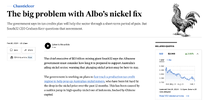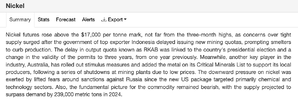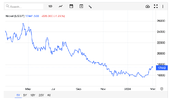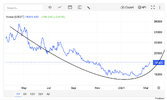Sean K
Moderator
- Joined
- 21 April 2006
- Posts
- 22,933
- Reactions
- 12,959
I do wonder when the hell nickel is going to be back.

The tax credits would provide financial support to miners by allowing them to either reduce their tax bills or claim tax refunds.
On Sunday, Prime Minister Anthony Albanese described the proposed tax credit regime as “smart, targeted, time-limited support” and said the current crisis in the nickel sector was “a short-term issue for what is, in the long term, a very critical industry for Australia”.
But South32 boss Graham Kerr questions whether nickel is being hit with short-term, cyclical forces, and sees a more structural change.
Indonesian nickel production has ramped up quickly in the past in response to price increases, he says, but the difference this time is that the Indonesian mines have been able to rapidly deploy technology to convert the nickel they produce into high-quality, battery-grade material.
Kerr sees no reason for Indonesian producers to take their foot off the accelerator any time soon. And he doubts that nickel buyers – mainly battery producers and electric vehicle manufacturers struggling with a sudden drop in demand – will suddenly start to pay a so-called “green premium” for more sustainably produced nickel from Australia.
If industry dynamics are unlikely to change quickly, the government will face a quandary around its tax credit plan.
“I think if you’re going to have support, you’ll have to think about how long you will provide that support for,” Kerr says.

The tax credits would provide financial support to miners by allowing them to either reduce their tax bills or claim tax refunds.
On Sunday, Prime Minister Anthony Albanese described the proposed tax credit regime as “smart, targeted, time-limited support” and said the current crisis in the nickel sector was “a short-term issue for what is, in the long term, a very critical industry for Australia”.
But South32 boss Graham Kerr questions whether nickel is being hit with short-term, cyclical forces, and sees a more structural change.
Indonesian nickel production has ramped up quickly in the past in response to price increases, he says, but the difference this time is that the Indonesian mines have been able to rapidly deploy technology to convert the nickel they produce into high-quality, battery-grade material.
Kerr sees no reason for Indonesian producers to take their foot off the accelerator any time soon. And he doubts that nickel buyers – mainly battery producers and electric vehicle manufacturers struggling with a sudden drop in demand – will suddenly start to pay a so-called “green premium” for more sustainably produced nickel from Australia.
If industry dynamics are unlikely to change quickly, the government will face a quandary around its tax credit plan.
“I think if you’re going to have support, you’ll have to think about how long you will provide that support for,” Kerr says.






